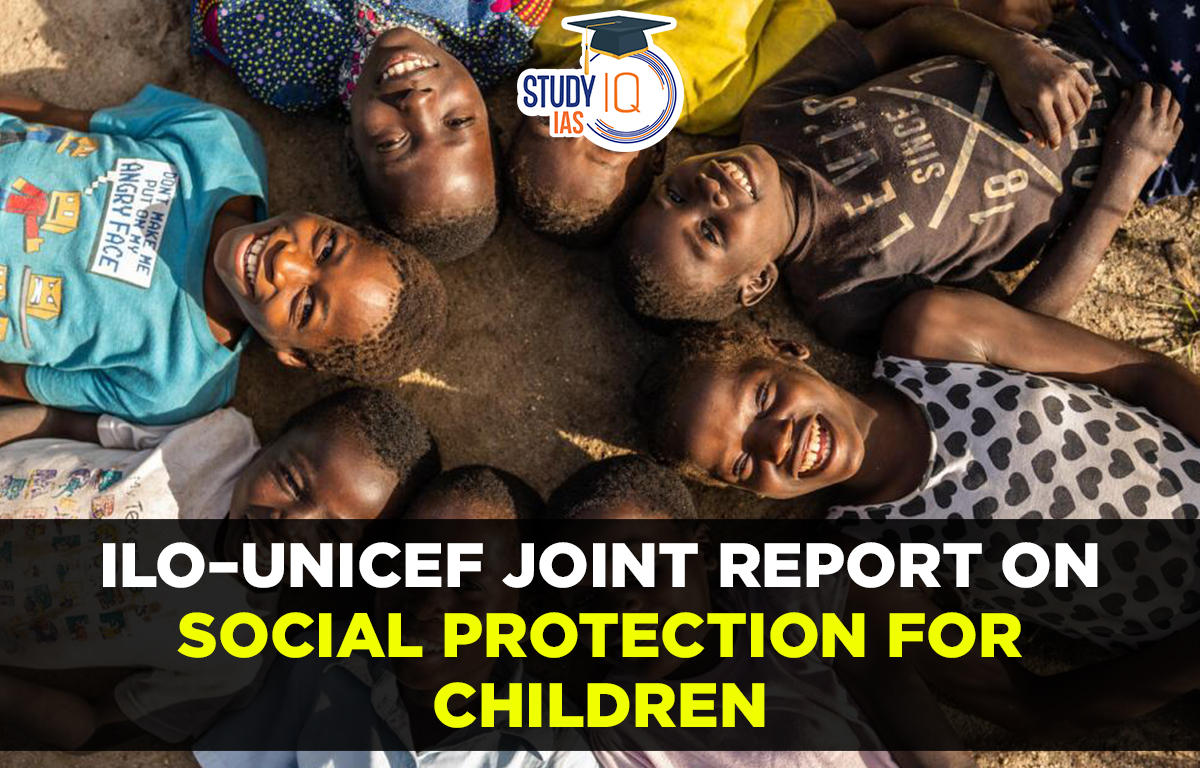Table of Contents
Context: The Second International Labour Organization–UNICEF joint report on social protection for children has been released.
Social Protection and its Need
- Social protection is a universal human right and a precondition for a world free from poverty.
- It is also a vital foundation to help the world’s most vulnerable children fulfill their potential and increase their access to food, nutrition, education, and healthcare.
- It provides resilience for households, allowing them to boost their productivity and earning potential, and lowers the risk of the intergenerational transmission of poverty.
- Investment in social protection for children expands human capabilities and productivity. It also fuels economic growth, contributing to more sustainable tax and transfer systems.
International Labour Organization(ILO)
- It was created in 1919, as part of the Treaty of Versailles that ended World War I.
- It is devoted to promoting social justice and internationally recognized human and labour rights.
- ILO is the only tripartite U.N. agency with government, employer, and worker representatives.
- India is a founder member of ILO.
- At present the ILO has 187 Members.
- It is headquartered in Geneva, Switzerland.
Key Highlights of the Report
- Access to Social Protection: Approximately 1.5 billion children below the age of 15 years currently have no access to social protection.
- In 2020, only 26.4% of children under 15 years globally received social protection cash benefits.
- Multidimensional Poverty: Over a billion children are living in multidimensional poverty i.e deprived of key dimensions of childhood such as health, education and nutrition.
- This results in heightening rights violations such as child labour and child marriage, and diminishing children’s aspirations and opportunities.
- Regional Disparities: Significant and troubling regional disparities exist in effective social protection coverage for children.
- In the Americas, coverage is 57.4%.
- Coverage remains relatively low in the Arab States at 15.4 %.
- In Asia and the Pacific, coverage is currently 18.0 %.
- Shock Responsiveness: With 73% of the world’s extreme poor and 24% of the global population currently living in fragile context, the need for shock-responsive social protection systems is urgent.
- This includes humanitarian assistance, humanitarian cash transfers, policy frameworks and operational mechanisms that allow the inclusion of populations impacted by crises.
- Gender Gap: Girls and women have been disproportionately impacted by multiple crises. They also experience higher poverty rates than boys and men and face multiple systematic barriers that impede gender equality.
- Disabled Children: Children with disabilities or living in a household with a family member with a disability are more vulnerable to poverty and face financial barriers to a full life, but are less likely to receive adequate social protection.
- Enhanced Challenges: Children constitute 41% of the 83.9 million forcibly displaced people across the world.
- Displaced children are at high risk of spending a quarter of their childhood in deprivation and facing uncertain futures.
Universal Child Benefits Schemes (UCBs): India
- National Scheme:
- PM CARES: The report states that 31 States have implemented the national “PM CARES for Children” scheme.
- This scheme supports children who have lost both parents or surviving parent or legal guardian or adoptive parents due to COVID-19 pandemic. It involves financial support till 23 years of age.
- PM CARES: The report states that 31 States have implemented the national “PM CARES for Children” scheme.
- State Schemes:
- Mukhya Mantri Kanya Utthan Yojana: It was launched in Bihar for young women aged 0–21 years and is fully funded by the state government, with the aim of combating systemic discrimination and gender inequality.
- Mukhya Mantri Sukanya Yojana: It was introduced in Jharkhand for girls and young unmarried women aged 0–20 years.
- Mukhya Mantri Kanya Sumangla Yojana: It was introduced in Uttar Pradesh for young unmarried women aged 0–18 years.
- They receive approximately 15,000 rupees split into seven installments over the life course.
Key Recommendations of the Report
- Accelerate progress towards universal coverage for children as a critical step towards improving their well-being.
- Guarantee adequate benefit levels to generate meaningful change in children’s lives.
- Provide a comprehensive range of benefits that supports children and families through a life-cycle approach.
- Ensure sustainable and equitable financing of social protection systems that allows for the necessary investment in social protection for children.
- Build social protection systems that are rights-based, inclusive, gender-responsive, informed by social dialogue and able to effectively respond to multiple shocks and crises.
- Ensure that social protection systems are adapted to developments in the world of work to enhance economic security for parents, caregivers and their families.





















 WhatsApp
WhatsApp